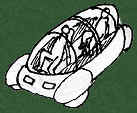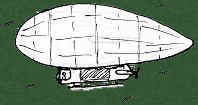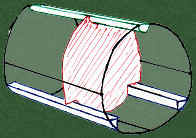Traffic Reduction | Verkehrsreduktion |
| In panocracy, there will automatically be much less traffic, which will have many advantages. Far less resources (eg material, energy, life time) will be used up to move things and people around, the environment will be far less polluted, and the risk for accidents (also think of animals!) will drop enormously, too. Reduced noise, fresher air, less stress all included. Let´s now take a look at the main sectors of traffic, and how the structure of panocracy will affect them: | In der Panokratie wird es automatisch viel weniger Verkehr geben, was einige Vorteile mit sich bringen wird. Viel weniger Ressourcen (Material, Energie, Lebenszeit) werden aufgebraucht, um Dinge und Menschen durch die Gegend zu bewegen, die Umwelt wird sehr viel weniger belastet, und das Unfallrisiko (man denke auch an Tiere!) wird sehr deutlich sinken. Reduzierter Lärmpegel, reinere Luft, weniger Streß inklusive. Schauen wir uns nun die Hauptverkehrssektoren an, und wie sich die Struktur der Panokratie auf sie auswirken wird:
|
| 1. Work Commutation: Remember that work will be reduced? But thatīs not even the main point here. Since almost all work is done in your own Moy or Poy cell, the maximum distance should not exceed 2 km, which takes 20 minutes walking; the typical distance will be about 300 m (= 3 minutes walking). Even if one needs to go to a neighboring Poy cell, this still takes only a short bike ride. From one end of a large Fay cell to the other will hardly ever exceed 20 km; but typical Fay distances will be 5 km, which takes 10 to 20 minutes cycling. If your presence will be required in a remote place for some while (for instance as an engineer in a technology project, or as a lecturer for an academic specialization class), you will rather temporarily move in a Moy cell close there than commute. | 1. Berufsverkehr: Erinnerst du dich noch an die Arbeitsreduktion? Aber dies ist noch nicht einmal der Hauptausschlagspunkt hier. Da beinahe alle Arbeiten in der eigenen Moy- oder Poyzelle ausgeübt werden, dürfte die Maximalentfernung 2 km kaum überschreiten, was 20 Minuten Fußweg entspricht; die übliche Wegstrecke wird etwa bei 300 m liegen (= 3 Fußminuten). Selbst wenn man mal in eine benachbarte Poyzelle muß, ist das nur ein Katzensprung mit dem Fahrrad. Sogar eine sehr große Fayzelle wird von einem Ende zum anderen kaum je 20 km überschreiten; die übliche Distanz innerhalb einer Fayzelle wird um die 5 km liegen, was 10 bis 20 Minuten mit dem Fahrrad bedeutet. Wenn deine Anwesenheit für eine Weile an einem entfernten Ort notwendig wird (etwa als Ingenieur bei einem Technologieprojekt oder als Lehrer für einen akademischen Spezialisierungskurs), dann wirst du eher vorübergehend in eine Moyzelle dort in der Nähe ziehen, als dauernd hin- und herzupendeln. |
| 2. Goods Transportation: Production will be reduced, as has been shown earlier. In particular, sending goods several times across the globe to have something produced, just because the workers in countries far away can be exploited for even much less money than the transportation costs, simply wonīt exist anymore in panocracy. Goods transportation will be effectively reduced because of the sub-preference principle: everything that can be produced or offered within the cell, will be done so; imports (goods or service requests) will be used only if really indispensable. For example, either one can grow bananas near, or they will just not be available. Other foods provide as much nutritive value and taste. The effort to regularly import masses of bananas from far away against natureīs odds grossly exceeds the advantages of this luxury. Of course there will still be a certain amount of goods transportation, but in almost all cases the goods will travel in nearly straight lines from first source to final destination. Goods transportation will be either done by people who feel responsible for and derive gratification from it, and/or by people who simply enjoy the travelling but donīt mind transporting some few goods along with them. The various transportation devices (see below) might even attract people who just want to steer them once (after a sufficient driving training, of course). They will be allowed if they load the device with goods in the source cell, and unload the goods in the destination cell (senders and recipients will help them). | 2. Gütertransport/Warenverkehr: Wie schon gezeigt wurde, wird die Produktion reduziert sein. Im Besonderen die Praxis, Güter einige Male um den Globus zu schicken, um irgend etwas herzustellen, nur weil die Arbeiter in weit entfernten Ländern für noch weniger Geld ausgebeutet werden können als der Transport kostet, wird in der Panokratie schlicht und einfach nicht mehr existieren. Der Gütertransport wird aufgrund des Subpräferenzprinzips effektiv reduziert sein: alles, was innerhalb der Zelle produziert oder getan werden kann, wird so durchgeführt; importiert (Güter- oder Serviceanfrage) wird nur dann, wenn es wirklich unausweichlich ist. Ein Beispiel: Entweder man schafft es, Bananen in der Nähe anzubauen, oder es wird ganz einfach keine geben. Es gibt auch andere vergleichbar nahrhafte und gut schmeckende Nahrungsmittel. Der Aufwand, regelmäßig große Mengen an Bananen von weit her den natürlichen Gegebenheiten zum Trotz zu importieren, läßt sich mit den Vorteilen dieses Luxus in keiner Weise rechtfertigen. Natürlich wird es ein gewisses Maß an Warenverkehr geben, aber in fast allen Fällen werden die Güter nahezu geradlinig von der Ursprungsquelle zum Endziel reisen. Der Warentransport wird entweder von Menschen übernommen, die sich dafür verantwortlich fühlen und darin Erfüllung finden, und/oder von Leuten, die einfach das Reisen lieben und denen es nichts ausmacht, ein paar Güter mit auf den Weg zu nehmen. Die verschiedenen Transportmittel (siehe unten) können sogar Leute anziehen, die sie einfach einmal steuern wollen (natürlich erst nach einem hinreichenden Fahrkurs). Dies dürfen sie, wenn sie das Gefährt in der Quellzelle mit Gütern beladen, und in der Zielzelle entsprechend entladen (die Absender und die Empfänger werden ihnen dabei helfen). |
| 3. Leisure, Shopping and Visiting Traffic: Going to the disco, the sports club, the theatre, going shopping, visiting/meeting friends and so on today often is done by car. In panocracy, all those things will be usually done within your own Moy or Poy cell. Your best friends are near, people for small talk or flirt are near, your family is near, many different entertainment facilities are near, and the supermarket equivalent (the cellīs storage facilities) is also near, eg within your own Poy cell. Therefore, you may walk several times from one corner in your Poy cell to the other in the course of a day, but only rarely will you travel away to another Poy cell or even farther for the above mentioned activities. | 3. Freizeit-, Einkaufs- und Besuchsverkehr: Ab in die Disko, zum Sportverein, ins Theater, zum Einkaufen, Freunde besuchen oder treffen und so weiter, all das erledigt man heute oft mit dem Auto. In der Panokratie kann man dies alles in der Regel aber in der eigenen Moy- oder Poyzelle tun. Du findest alles ganz in deiner Nähe: deine besten Freunde, Leute zum Plaudern oder Flirten, deine Familie, viele verschiedene Freizeiteinrichtungen, das Äquivalent zum Supermarkt (die Warenlager der Zelle)... Aus diesem Grund wirst du für die oben genannten Aktivitäten zwar eventuell mehrere Male am Tag von einer Ecke zur nächsten in deiner Poyzelle wandern, aber nur selten in eine andere Poyzelle oder noch weiter müssen. |
| 4. Business Travelling: Can be almost entirely replaced by telecommunication. | 4. Dienstreisen: Können nahezu komplett durch Telekommunikation ersetzt werden. |
| 5. Vacation Travelling: Might still occur, and since thereīs no money, some people might even travel all their life around if it pleases them. However, most people will be just so happy where they live, that they wonīt neither need nor desire travelling to other nice places as often. | 5. Urlaubsverkehr: Wird noch vorkommen, und da es kein Geld gibt, wird es eventuell Leute geben, die ihr ganzes Leben lang herumreisen, wenn es ihnen Spaß macht. Die meisten Menschen jedoch werden da wo sie sind einfach so glücklich sein, daß sie weder das Bedürfnis noch den Wunsch haben werden, andere schöne Orte so oft aufzusuchen. |
| 6. Emergency Traffic: Besides the fact that violence, accidents and health emergencies will occur much less often (and usually to a lesser degree), the main emergency facilities will be just within the Poy cell. For really severe incidents, head for the Fay cellīs more specialized ones (or get help from there). Almost never there needs to be emergency transportation over even longer distances. | 6. Rettungsverkehr: Abgesehen von der Tatsache, daß Gewalt, Unfälle und gesundheitliche Notfälle sehr viel seltener auftreten werden (und zudem meist weniger dramatisch), verfügt jede Poyzelle über die wichtigsten Rettungseinrichtungen. Bei besonders schweren Notfällen müssen eventuell die besser spezialisierten Einrichtungen der Fayzelle in Anspruch genommen oder von dort Hilfe angefordert werden. Es wird so gut wie niemals vorkommen, daß Rettungstransporte noch weitere Strecken zurücklegen müssen. |
| Some examples for transportation (others will most likely exist) are shown below, with a short discussion of goods transportation for each. | An dieser Stelle folgen nun ein paar Beispiele für Transportarten (es wird sehr wahrscheinlich auch andere geben), wobei jeweils auf den Gütertransport eingegangen wird. |
| Walking/Hiking: alone as a meditative experience in nature or as a physical exercise, or in a group with some friends. You may transport some small quantities of goods in your backpack. (You hardly need to take water and food with you, for you will get these at every cell you pass.) |  | Wandern: alleine als meditative Naturerfahrung oder als Körperertüchtigung, oder in einer Gruppe mit ein paar Freunden. Im Rucksack können kleine Gütermengen mittransportiert werden. (Proviant braucht eigentlich kaum mitgenommen werden, da Wasser und Nahrung in jeder Zelle an der man vorbeikommt zu haben sind.) |
| Bicycle: alone or in a small group. Goods can be transported in a backpack, or on the carrier rack (also in a special rack bag). |  | Fahrrad: alleine oder in einer kleinen Gruppe. Güter können im Rucksack oder auf dem Gepäckträger (auch in einer speziellen Gepäckträgertasche) transportiert werden. |
| Canoe/Boat: possible where there are safe waterways. One or more persons per boat, maybe in a group of boats. Relatively big quantities of goods can be transported. (However, against the current there should be no heavy loads onboard, for it would be to exhausting.) |  | Kanu/Paddelboot: möglich, wo es sichere Wasserwege gibt. Eine oder mehr Personen pro Boot, eventuell in einem Bootsverband. Relativ große Gütermengen können auf diese Weise transportiert werden. (Allerdings sollten stromaufwärts keine großen Lasten an Bord sein, da dies zu kräftezehrend wäre.) |
| Pedal Car: a heavy load bike with three or four wheels, maybe for more than one cyclist, probably with a weather-protection casing. Containers for transporting goods can be part of the construction. [The sketch image shows a car with a perspex cabin that can be rode alone or with a friend, has two large transportation boxes to the sides, a single rear wheel driven by the pedals, and two steering wheels in front.] |  | Transportrad/Tretauto: ein Lastrad mit drei oder vier Rädern, eventuell für mehr als einen Fahrer, möglicherweise mit einem Gehäuse als Wetterschutz. Container für den Gütertransport können Teil der Konstruktion sein. [Die Skizze zeigt ein Tretauto mit einer Plexiglas-Kabine, das allein oder zu zweit gefahren werden kann, zwei große Transportboxen an den Außenseiten neben den Fahrern besitzt, ein einzelnes von den Pedalen angetriebenes Hinterrad und vorn zwei Steuerräder.] |
| Airship: the propellers are driven by an engine. Will be used mainly for long-distance travel, can transport relatively heavy loads, and is a good example for the combination of tourism, entertainment and goods transportation. There will most certainly always be people who want to fly with an airship. On their first trip they might watch the driver, who at the same time teaches them how to fly the thing, and on the return trip they might already steer the airship themselves. They will be willing to help load and unload the cargo cabin to add practical purpose to the fun. |  | Luftschiff: die Propeller werden von einem Motor angetrieben. Wird vor allem für Fernstrecken genutzt, kann relativ schwere Lasten bewegen, und ist ein gutes Beispiel für die Kombination von Tourismus, Unterhaltung und Gütertransport. Es wird mit Sicherheit immer Leute geben, die mit einem Luftschiff fliegen wollen. Auf dem ersten Flug können sie dem Piloten über die Schultern schauen, der ihnen die Steuerung erklärt, und schon auf dem Rückflug können sie es selbst lenken. Sie werden dafür gerne den Lastenraum mit be- und entladen, um dem Spaß gleich noch etwas praktischen Nutzen hinzuzufügen. |
The Materioport | Der Materioport |
| For transportation, Tobi Blubb thought up the so-called materioport, a magnetic levitation train system travelling in a tube [one segment of which is shown in the picture]. Two static magnet rails [blue in the picture] shall levitate the train [a slice of which is shown red in the picture], and a linear electromagnetic motor [the green top rail in the picture, combined with electric and electronic equipment in the ceiling of the train] accelerates (and upon arrival stops) the device. The tube shall contain a slight vacuum for even less friction. |  | Für den Transport hat sich Tobi Blubb den sogenannten Materioport ausgedacht, eine Magnetschwebebahn, die sich in einer Röhre [das Bild zeigt ein Segment davon] fortbewegt. Zwei Dauermagnetschienen [blau im Bild] balancieren den Wagen [eine Schnittfläche ist im Bild rot dargestellt] über dem Boden, und ein elektromagnetischer Linearmotor [die grüne Deckenschiene im Bild in Verbindung mit elektrischen und elektronischen Komponenten im Wagen] beschleunigt (und bremst) das Gefährt. Die Röhre soll ein leichtes Vakuum enthalten, für noch weniger Reibungsverluste. |
| Tobi Blubb writes that the materioport would use only very little energy and travel very fast, and thus be a good invention. But in fact the production of the tube system would consume a lot of energy and material. And to create even the slightest vacuum in a many kilometers long tube would require very much energy. However, there might be improved low-friction transportation systems in the future that do pay off the production efforts. A tube system has the advantages of weather protection, reduced noise, and an almost zero accident risk. | Tobi Blubb schreibt, daß der Materioport nur sehr wenig Energie verbrauchen würde und sehr schnell wäre, also eine gute Erfindung. In Wirklichkeit jedoch würde die Herstellung des Röhrensystems sehr viel Energie und Material verbrauchen. Und um in einer kilometerlangen Röhre auch nur ein ganz leichtes Vakuum zu erzeugen, müßte man Unmengen an Energie verbraten. Trotzdem könnte es einmal verbesserte reibungsarme Transportsysteme geben, bei denen der Nutzen den Produktionsaufwand übersteigt. Ein Röhrensystem hat die Vorteile des Wetterschutzes, reduzierter Geräuschbelastung, und nahezu vollkommener Unfallsicherheit. |